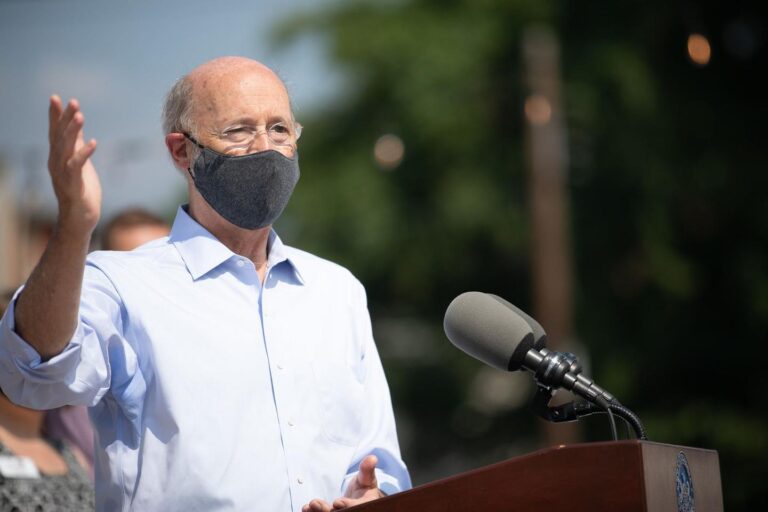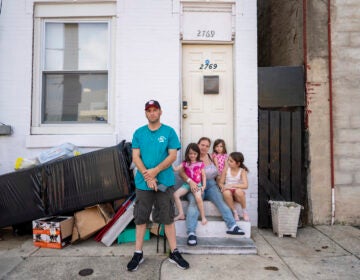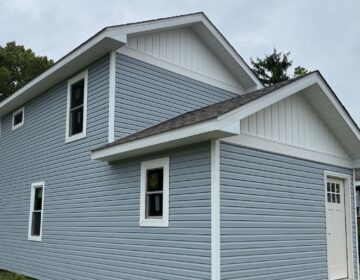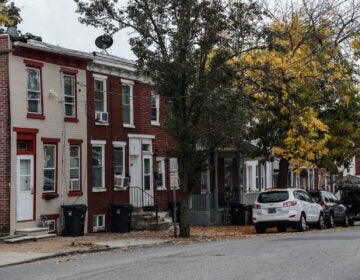Wolf won’t extend state’s eviction moratorium, office says
Gov. Tom Wolf will not extend his executive order halting evictions and foreclosures in Pennsylvania because of legal limits that prevent him from taking further action.

Gov. Tom Wolf (Commonwealth Media Services)
Updated: 2:30 p.m.
Gov. Tom Wolf’s administration reiterated that he will not extend his executive order halting evictions and foreclosures in Pennsylvania because of legal limits that prevent him from taking further action.
In a statement, Wolf’s office said it had explored the possibility that it could build off of the Federal Housing Administration’s Thursday extension of its national foreclosure and eviction moratorium through December.
“But after a thorough legal review, we have determined that the governor cannot extend the executive order to reach additional Pennsylvanians who are not benefiting from the federal extensions and a legislative fix is necessary in order to protect homeowners and renters from eviction,” Wolf’s office said.
The Federal Housing Administration’s moratorium protects homeowners with FHA-insured single-family mortgages.
Housing advocates predict a rush to Pennsylvania’s courthouses and a wave of evictions once the moratorium expires.
Wolf, a Democrat, last week said he does not have the legal authority to extend the moratorium beyond August, and urged the state’s Republican-controlled Legislature to pass legislation to extend the statewide moratorium, which for almost six months has shielded renters from losing their homes for failing to pay rent during the pandemic.
Earlier Monday, Wolf had briefly made it sound like he might reverse himself and extend it. Asked if he would, he replied, “you have to wait and see.”
The state House of Representatives returns to voting session Tuesday and the Senate was scheduled to return next week. Republicans have said they will discuss the matter, but gave no promises.
Like many Democratic and Republican governors and local officials around the U.S., Wolf imposed a moratorium on foreclosures and evictions to prevent people from losing their homes in the midst of the virus outbreak and widespread joblessness.
On July 9, he extended the statewide moratorium until Aug. 31, saying renters needed more breathing room. A landlords group and individual landlords tried to get the moratorium overturned, but the state Supreme Court dismissed their suit.
In other coronavirus-related developments in Pennsylvania:
Paid sick leave legislation
Wolf is urging lawmakers to pass legislation that requires businesses to provide paid sick and family leave for workers, saying Monday that it will help prevent the spread of the coronavirus.
Wolf said many workers lack any paid time off, and those working paycheck-to-paycheck are likelier to go to work, even if they feel sick, and infect co-workers.
“Workers should not have to choose between their job and their health, especially during this pandemic,” Wolf told a news conference Monday morning in Harrisburg.
The disparity in access to paid sick leave grows farther down the income ladder, with many more low-wage workers lacking it, Democrats say.
Thirteen states and Washington D.C. have enacted laws to require paid sick leave, according to the National Conference on State Legislatures. A few states have temporarily broadened access to paid sick leave in response to the coronavirus, but none have adopted permanent and broad paid sick leave measures.
Paid sick leave legislation introduced by Democrats has sat untouched since last year in the Republican-controlled Legislature, amid opposition by business advocacy groups. Senate Republicans, in 2015 and 2017, tried but failed to block a Philadelphia city ordinance requiring paid sick leave. Pittsburgh also has a paid sick leave ordinance.
Democrats have redoubled efforts to urge the bills’ passage since the onset of the pandemic in March, saying requiring paid sick leave would lower health care costs, make workers and workplaces more efficient and improve public health.
Restrictions on Restaurants
Wolf gave no hint Monday that he is considering relaxing restrictions on restaurant and bar capacity, which he ordered limited to 25% in July amid a resurgence of the virus linked, by some contact tracing data, to people eating and drinking in bars and restaurants or working in them.
Asked if he had any plans to relax those restrictions as colder weather increasingly prevents outdoor seating, Wolf on Monday said he is focused on getting children back to school, “and anything we do to take our eyes off that ball is going to be a problem.”
Wolf also ordered nightclubs to shut down and bars to close, unless they also offer dine-in meals.

Get daily updates from WHYY News!
WHYY is your source for fact-based, in-depth journalism and information. As a nonprofit organization, we rely on financial support from readers like you. Please give today.



![CoronavirusPandemic_1024x512[1]](https://whyy.org/wp-content/uploads/2020/03/CoronavirusPandemic_1024x5121-300x150.jpg)


